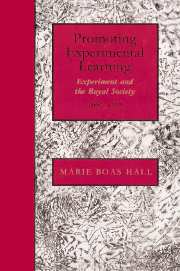Book contents
- Frontmatter
- Contents
- List of figures
- Preface
- A note on dates
- 1 Introductory
- 2 Aims and ideals
- 3 The record of the minutes 1660–1674
- 4 The communication of experiment 1660–1677
- 5 The record of the minutes 1674–1703
- 6 The communication of experiment 1677–1803
- 7 The record of the minutes 1703–1727
- 8 The communication of experiment 1703–1727
- 9 The view of the world; friend and foe
- Abbreviated titles
- Notes
- Bibliography
- Index
2 - Aims and ideals
Published online by Cambridge University Press: 03 December 2009
- Frontmatter
- Contents
- List of figures
- Preface
- A note on dates
- 1 Introductory
- 2 Aims and ideals
- 3 The record of the minutes 1660–1674
- 4 The communication of experiment 1660–1677
- 5 The record of the minutes 1674–1703
- 6 The communication of experiment 1677–1803
- 7 The record of the minutes 1703–1727
- 8 The communication of experiment 1703–1727
- 9 The view of the world; friend and foe
- Abbreviated titles
- Notes
- Bibliography
- Index
Summary
The primary aim of the Royal Society has never been in doubt, for it was recorded in the minutes of the first, preliminary meeting on 28 November 1660. Then those gathered in the room of Lawrence Rooke (d. 1662), Gresham Professor of Astronomy, spoke of ‘a designe of founding a Colledge for the promoting of Physico-Mathematicall Experimentall Learning’, which it seemed might best be done by having ‘a more regular way of debating things, and according to the manner of other countries’ in order to ‘the promoting of experimentall philosophy’. The repeated emphasis upon experiment is the more worthy of notice because it was entirely original. By no means were all the foreign independent academies experimental in concept, while the Accademia del Cimento, which was, had been organised by, and worked directly under, private patronage and control. In contrast, the new English society was to be both experimental and independent, an organised continuation of private meetings that had taken place earlier, first in London in 1645 and later, then also in Oxford, now to be reformed with the addition of many who had returned with the King from exile on the Continent. The Royal Society was to be exceptional both in its attitude and in its procedures, while its emphasis upon experiment long remained its hallmark. As one of its first Secretaries, Henry Oldenburg, defined it in 1664, it was
a Corporation of a number of Ingenious and knowing persons, by ye Name of ye Royall Society of London for improving Naturall knowledge, whose dessein it is, by Observations and Experiments to advance ye Contemplations of Nature to Use and Practice.
- Type
- Chapter
- Information
- Promoting Experimental LearningExperiment and the Royal Society, 1660–1727, pp. 9 - 23Publisher: Cambridge University PressPrint publication year: 1991



